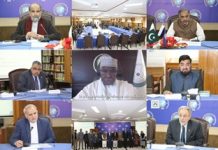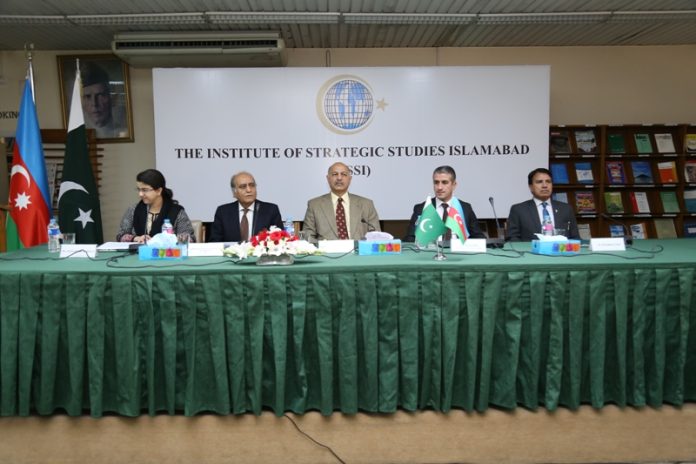Press Release
Seminar
on
“Genocide and Ethnic Cleansing – Khojaly 25”
in collaboration with the
Embassy of Azerbaijan
February 21, 2017
The Khojaly genocide of the 20th century is one of the most serious crimes in history not only against the people of Azerbaijan but humanity as a whole. This was stated by H.E. Ali Alizada, Ambassador of the Republic of Azerbaijan, during his keynote address, at a Seminar on “Genocide and Ethnic Cleansing – Khojaly 25” organised by the Institute of Strategic Studies Islamabad (ISSI) in collaboration with the Embassy of Azerbaijan today.
The Chief Guest on the occasion was Senator Mushahid Hussain Sayed, Chairman, Senate Defence Committee. Other dignitaries of the seminar included Ms. Shaza Fatima Khawaja, MNA and Convener of the Pakistan-Azerbaijan Parliamentary Friendship Group and Dr. Muhammad Khan, former HoD, Dept. of IR, NDU. A video on the Khojalay Genocide was also shown at the event.
Senator Mushahid HussainSayed stated that Pakistan has given unreserved support to Azerbaijan. He highlighted the commonality between the situations in Kashmir and Nagorno-Karabakh. Pakistan and Azerbaijan have a solid history and in the future there needs to be greater coordination between both countries especially on the issues of Kashmir and Nagorno-Karabakh. He stressed on the urgency of both countries taking up a joint research initiative so as not to be left behind in the battle of ideas.
Ambassador Khalid Mahmood, Chairman Board of Governors of ISSI, in his welcome remarks stated that the Khojaly genocide was one of the most tragic events of Azerbaijan’s history. He said that Pakistan and Azerbaijan are linked by histories and intense exchange of thinkers. Pakistan has provided endless support to Azerbaijan and has consulted its efforts with Azerbaijan in highlighting this tragedy.
H.E. Ali Alizada gave a brief overview of the events of the genocide – the Khojaly graveyard is a symbol of all the atrocities that took place during this incident. He highlighted that more than fourteen countries have recognised the incidents as genocide and relevant parliamentary resolutions have been passed. He stated that history provides evidence that such events can occur in the future too, and to avoid this repetition he said that there has to be a uniform stand against this crime and the perpetrators need to be brought to justice. The Ambassador was very appreciative of the friendship between the two countries and the solidarity between the two nations and acknowledged that Pakistan was one of the first countries which recognised this massacre as a genocide.
Ms. Shaza Fatima Khawaja in her speech stated that Pakistan and Azerbaijan have always been on the same page. She stated that Pakistan faces a similar situation in Kashmir, so Pakistan is well aware of what the people of Azerbaijan sense and is very grateful to the people of Azerbaijan for their support on the Kashmir issue. The Khojaly genocide is most definitely one of the worst massacres the world has seen- the gravity and enormity of the situation is overwhelming and cannot be justified and the way the people of Azerbaijan have come out of this bilateral issue is highly commendable.
Dr. Muhammad Khan in his presentation drew parallels between the atrocities in Kashmir and Nagorno-Karabakh and stated that the Khojaly massacre is a bloody episode of human history and a bloody page of the policy of ethnic cleansing and genocide pursued by the Armenian nationalists against Azerbaijani people over a hundred years. He also drew attention to the Human Rights report which described the event in Khojaly as “the largest massacre to date in the conflict”.He also highlighted the insensitivity of the international community, the silence of global media, and, no major actions from major powers.
Concluding the Seminar, the Chairman ISSI, Ambassador Khalid Mahmood, stated that the refugees need to be rehabilitated immediately to their homes and the atrocities need to end. He stated that the principle position of both countries on humanitarian issues demonstrates their fidelity to international law and upholding of human rights and international human law and serves to reinforce the deep bonds of friendship between the two nations.












